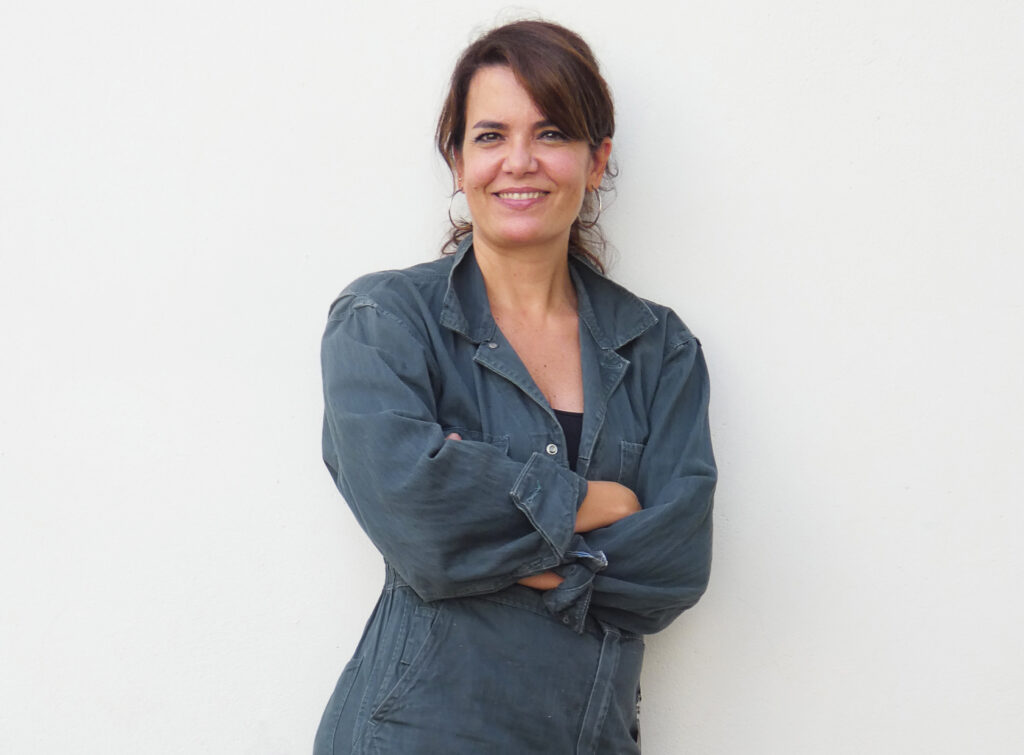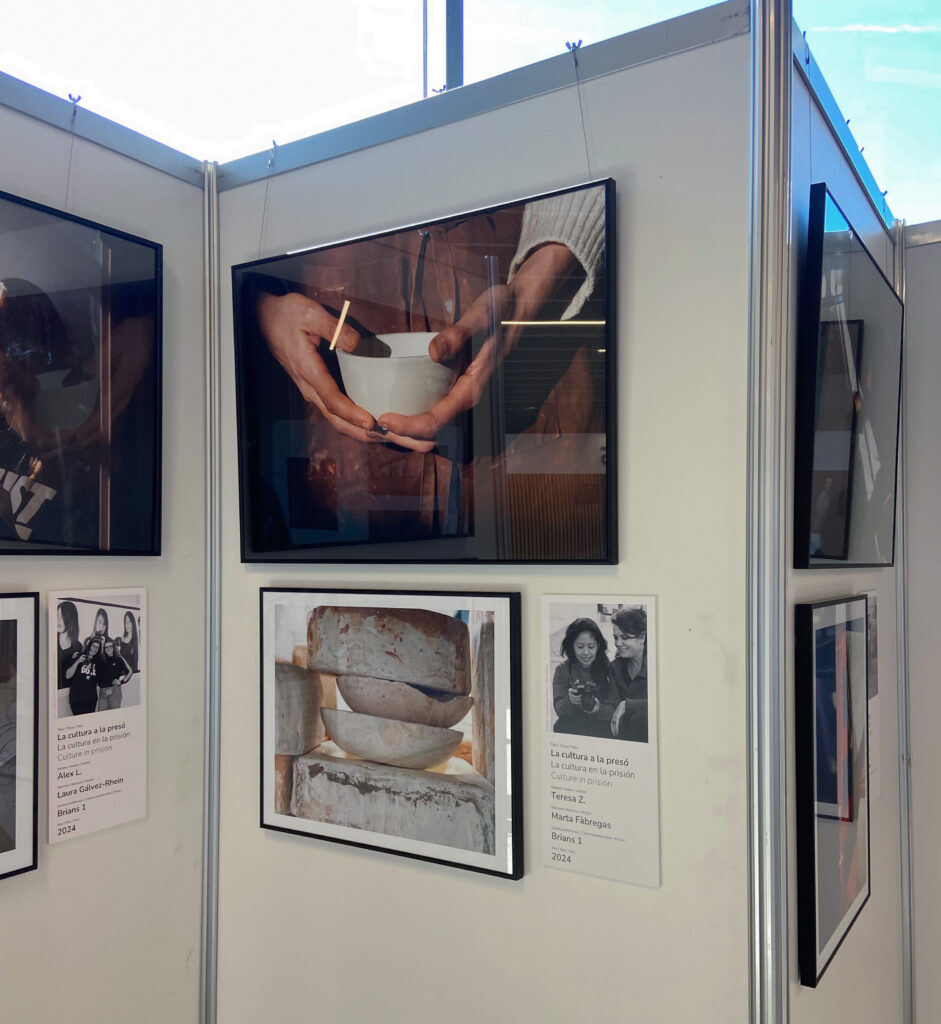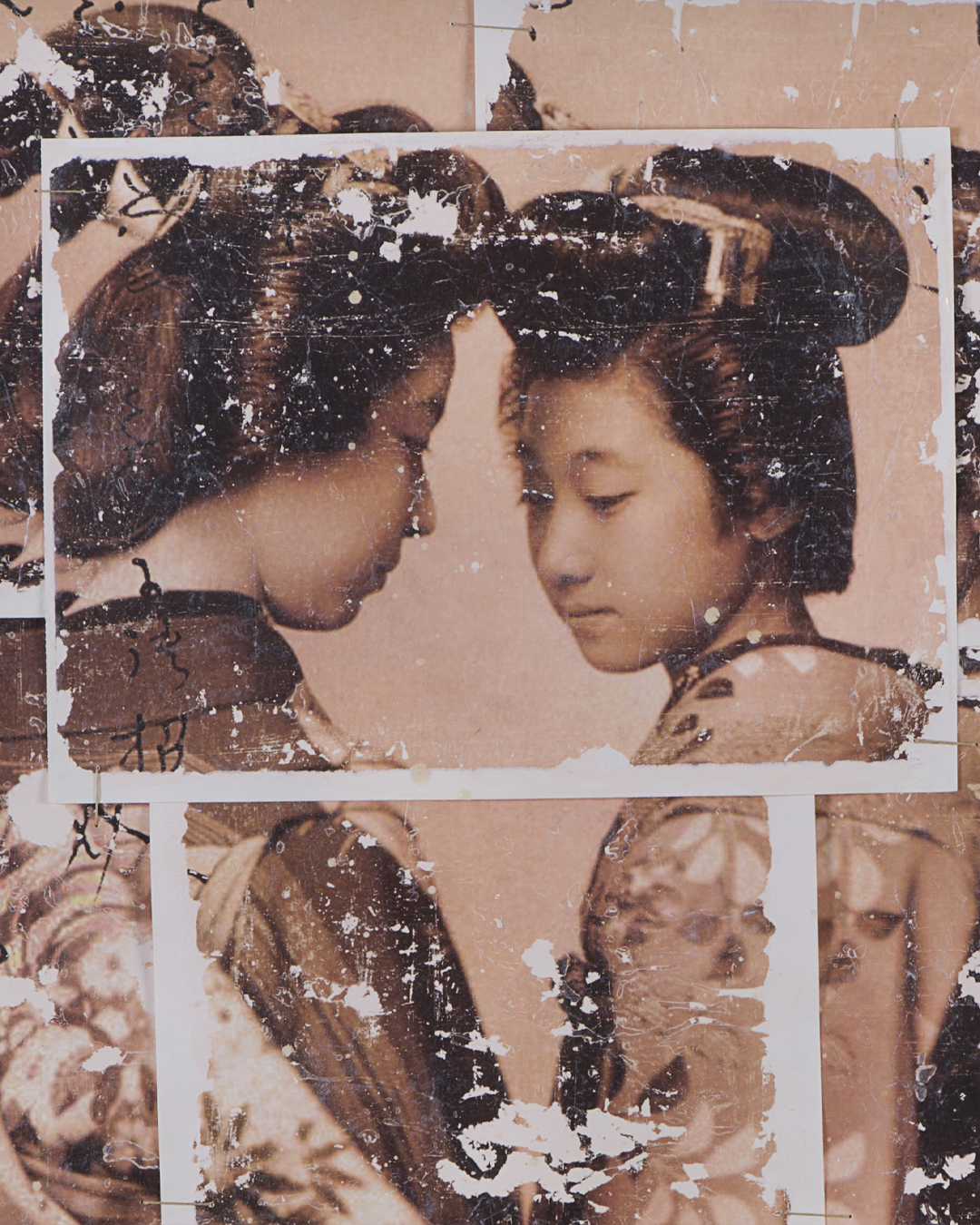Photography makes the invisible visible, empowers vulnerable groups or those at risk of social exclusion, makes people deprived of liberty feel a little freer, improves self-esteem, and brings people together under the umbrella of a collective feeling.
This is what we are going to question and discuss in a conversation with the photographer, artist and activist Marta Fàbregas.
Getting to know Marta Fàbregas
Trained at the IEFC (Institut d’Estudis Fotogràfics de Catalunya) and founder of her own photographic studio together with Marc Vidal – La Fotogràfica (since 1998), Marta addresses issues related to women both through her work and through social photography projects.
An example of her work in this sense is the series «Colonized«. In this personal project Marta recovers old images (19th-20th century) of women and gives them the visibility they never had.
These works are created by means of what she calls «transfotography». The technique she uses is transfer, which consists of transferring a printed image (previously digitally treated) to another surface (usually watercolour paper or natural linen).
On the other hand, Marta collaborates actively with the Setba Foundation, a non-profit organisation that contributes to social transformation through culture. One of the projects of this foundation in which Marta is the artistic director is «Traspasando el objetivo«.

The project "Traspasando el objetivo"
In English, » Passing through the lens» is a photography project for women inmates in prisons in Catalonia, with the aim of contributing to the improvement of the quality of life of the participants, by improving their self-esteem and promoting their integration into the labour market through photography.
The project began in January 2020 and, to date, has been running for 9 editions. Most of them have been carried out in the women’s module of the Brians 1 Penitentiary Centre in Sant Esteve Sesrovires, then in the Wad-Ras women’s prison in Barcelona, and finally this 2024 it has been carried out for the first time in the Ponent Centre in Lleida.
This initiative was born as a result of a request from Justice to the Setba Foundation. As the project has grown, it has been improved and new things have been included, such as mentoring and collaborations with other women photographers. The foundation wants to reach all the centres in Catalonia (for now Tarragona and Girona are still missing), forming a local team in the case of centres in provinces other than Barcelona.
In conversation with Marta

WHAT ARE THE TECHNICAL DIFFICULTIES INVOLVED IN HOLDING A PHOTOGRAPHIC WORKSHOP IN A PRISON ENVIRONMENT?
There are indeed many restrictions, as the access to the outside is very limited. When you enter the prison they make you leave your mobile phones and everything you have with you, so trying to enter with cameras is quite a challenge. The Setba Foundation has had to make many requests and obtain permissions to do so.
To use these photographs internally there is no problem, but to take them outside the centre they have to pass several filters, including a very exhaustive one from Justice. The inmates also have to sign the copyright and image rights. So, all the photos that appear in the book Brians: Invisible Women have been lucky enough to pass all these filters so that we can see them.
HOW DOES IT FEEL TO TEACH THIS WORKSHOP IN SUCH AN UNUSUAL CONTEXT, ESPECIALLY THE FIRST TIME?
On the one hand, it’s quite a shocking experience because of a spatial issue: the doors that open and close, going in there without your belongings or ID… you are a number. You realise that as you go through the doors your freedom is reduced.
But, on the other hand, from the beginning I was convinced to give the best of myself, to share and explain photography, and I took it as if I were going to teach anywhere else, an institute, a school or a university. I gave myself the premise that, even though there were many constraints, I would try to give the maximum quality and opportunity. For example, as they don’t have access to the internet, we give them photographic examples, or as they don’t have access to the photos they have taken, we bring them to them printed.
Once inside with the inmates, I have never had a feeling of danger or fear, on the contrary, they are very grateful women, who really appreciate us going there. At the end of the 10 sessions, a very nice bond is always generated. It is true that I made an exercise of not judging, of entering without prejudices, and even so, once inside you realise that you have more than you thought.
In short, their situation doesn’t condition my relationship with them. You share photography with women who are in a very difficult situation and you know that this is something that helps them to be better, especially because of the context that is created.
HAVE YOU EVER MISSED A PSYCHOLOGICAL SUPPORT OR ACCOMPANIMENT TO DEVELOP THESE SESSIONS?
The truth is that issues of self-knowledge and self-help have always interested me a lot, and I have read extensively about personal growth. Ten years ago, in a moment of personal crisis, artistic action is what saved me and gave me a purpose. What I share with them, beyond photography, is this aspect of personal growth. I have never felt the need for psychological support, but precisely because I have done a lot of personal work beforehand.
Years ago we did a project called imaginado(r)nes with the Setba Foundation with women at risk of social exclusion. First we did it at the Casa del Recés and then at the Maria Raventós foundation, with women who are generally minors with children under 3 years of age and whose custody has been taken away from them. Here, before and after the sessions, a colleague coach specialising in teenagers validated the exercises and proposals, to make sure I wasn’t doing anything harmful to them.
I don’t do art therapy, but it is true that through photography you can remove things that you have to be able to sustain.
CAMILA OLIVEIRA (PARTICIPANT 1ST EDITION) SAYS THAT THIS WORKSHOP IS VERY USEFUL FOR THEM BECAUSE IT MAKES THEM FEEL A "SENSE OF FREEDOM INSIDE PRISON". HOW DO YOU THINK IT AFFECTS OR BENEFITS THEIR LIFE INSIDE?
Yes, when I present the project I always tell them that it is a journey, a journey in search of the muses, of the women who inspire us. One of the themes I always put on the table is light, the ability to fly with the imagination, to find ourselves, to go beyond. I always use myself as an example and tell them how as a child I believed I could fly. I suppose that when you communicate from your own experience, it is transmitted to others. It is true that at the end of each edition there is always this reflection, that in the time spent photographing they have forgotten where they were and in what conditions. This is very gratifying.
It always creates a very clean and relaxed atmosphere. The relationships between them outside the workshop are very complex, and there are many things that we don’t know about, but in this space we manage to leave that aside. They relate to each other from a different point of view, and they discover their colleagues from a different perspective. Anyway, I never tell them who they have to work with, nor do I force any situation.
You can see the testimony of Camila Oliveira, participant of the 1st edition, quoted in the interview in this video of the Fundació Setba.
WHAT ARE THE DIFFERENCES BETWEEN THE GROUP WORK OF THE WORKSHOP AND THE INDIVIDUALISED WORK OF THE MENTORING?
All the women who participate in the workshop are eligible for a mentorship at the end of the workshop. The mentorship, which welcomes guest photographers, consists of 4 individualised sessions in which the mentoree develops a proposed theme. They are accompanied in making the report, with all the complications that this entails (time constraints, requesting permission, etc.).
In the first session the work dynamic is presented, in the second and third sessions the photographs are taken and in the last session all the material is visualised and the editing work is done. It is a much more enriching work. Sometimes there is more demand than supply of places. In that case, they are asked to fill in a form explaining why they want to be mentored and what they want to do. A jury is set up, votes are taken and the selected ones are chosen.
IN ADDITION TO THE DIRECT IMPACT ON THE INMATES, THE PROJECT ALSO SEEKS TO GIVE THEM VISIBILITY IN SOCIETY AND HELP THEM IN THEIR INTEGRATION INTO THE LABOUR MARKET, RIGHT?
Exactly, the foundation doesn’t just carry out the workshop, but also seeks to publicise it. To this end, they participate in photography festivals (such as the Photo Forum Fest or the Lumínic Festival), they have created a book, they organise exhibitions (such as the one at the Palau Robert), they are trying to create a line of team building events for companies where they talk about the project and where some of the women who are already outside participate, and so on.
The foundation also makes it possible for all the women who have been in «Traspassant l’obectiu» and are released in the third degree to do an introductory course in photography at the IEFC, so there is a real desire to help them reintegrate into the labour market.
THIS INVOLVEMENT WITH THE WORLD OF WOMEN IS PRESENT IN EVERYTHING YOU DO, HOW DO YOU COMBINE YOUR DIFFERENT AREAS OF WORK?
Ten years ago, at the age of 40, I suffered a major personal crisis as a result of several changes that happened at the same time in my life. It was at this time that I became a founding member of the network of businesswomen and entrepreneurs of St Cugat and that I started working on my personal work. I was passionate about ancient photography and, by trial and error, more as a personal need and entertainment, I realised that what seemed to me to be separate things had a common thread. That common thread was women. Probably because it was myself. I focused on self-care, making your dreams come true, believing in yourself,empowering yourself as a woman. In short, the common thread was that desire to talk about the world of women, to help and inspire other women.
That is the argument that ends up weaving all the things I do: my personal artistic production revolves around the world of women, as well as the projects of the Setba foundation and the whole subject of female entrepreneurship. I also continue to maintain the photographic studio. I do a lot of things, but I try to achieve and enjoy everything.

Photography as an agent of social transformation
Thanks to the conversation with Marta and the example of this project carried out in prisons in Spain, we see that photography has great potential to have an impact on the community. In this example, it generates an experience inside the prisons that contributes to the feeling of freedom, the improvement of the inmates’ self-esteem and the acquisition of new technical and artistic knowledge. Moreover, this impact does not remain in the centres but goes beyond them, with the aim of making this social group visible in society and providing them with resources for their social and work reintegration.
It was exciting for me to meet Marta during the Photo Forum Fest 2024 and to talk to her about freedom and female empowerment through art. The Setba Foundation firmly believes that culture is a universal right that should reach everyone, and they ensure that thanks to the commitment of people as Marta.
If you not only care about the positive social impact of photography, but also about its positive impact on the environment, check out this article on sustainable photography, in conversation with Chiara Salvi, founder of the photography school APA (Alternative Processes Academy).
From this conversation, I take away the idea that photography can be a force for good, inspired by a genuine concern for others and for the planet.


